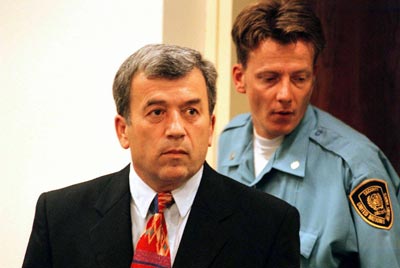Home
BRDJANIN’S SENTENCE REDUCED BY TWO YEARS
The Appeals Chamber granted two out of more than 150 grounds for appeal presented by Radoslav Brdjanin and reduced his sentence by two years – from 32 down to 30. Brdjanin is the former president of the ARK Crisis Staff
 Radoslav Brdjanin in the courtroom
Radoslav Brdjanin in the courtroom Radoslav Brdjanin, former president of the Crisis Staff and the War Presidency of the Autonomous Region of Krajina was today sentenced by the Appeals Chamber to 30 years in prison for the crimes committed in 1992 in northwestern Bosnia and Herzegovina. The judgment is final.
In September 2004, Brdjanin was found guilty by the Trial Chamber of the persecution of Bosnian Muslims and Croats on political, racial and religious grounds, killings, torture, destruction of towns and villages and deliberate destruction of places of worship. He was sentenced to 32 years in prison.
Both parties appealed the judgment. Brdjanin’s defense argued that the Trial Chamber erred in law and in fact in more than 150 instances. The Appeals Chamber, as Judge Meron explained, "dismissed summarily the majority of allegations from the appeal” finding them “mere claims”, “misinterpretations” and arguments that are either “irrelevant” or “contrary to common sense”.
The Appeals Chamber did grant two grounds in Brdjanin’s appeal and reversed the conviction for two elements of persecution as a crime against humanity: torture in camps and detention facilities and wanton destruction of Bosanska Krupa. This had only limited impact on the sentence as it was reduced only by two years.
The Appeals Chamber granted two grounds for appeal filed by the prosecution, related to legal issues stemming from the joint criminal enterprise doctrine but this had no effect on the judgment and sentence in this case.
Brdjanin was arrested and transferred to the Tribunal in July 1999. He has spent almost 8 years in detention and this time will be credited against his sentence. This means he has a little more than 12 years to do until he has served two thirds of his sentence. This is when persons convicted by the Tribunal are typically released.
